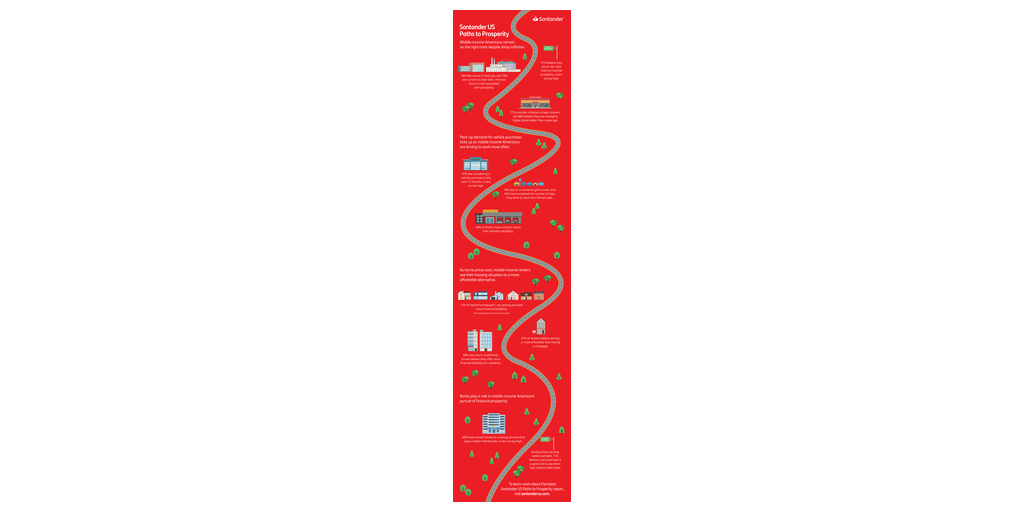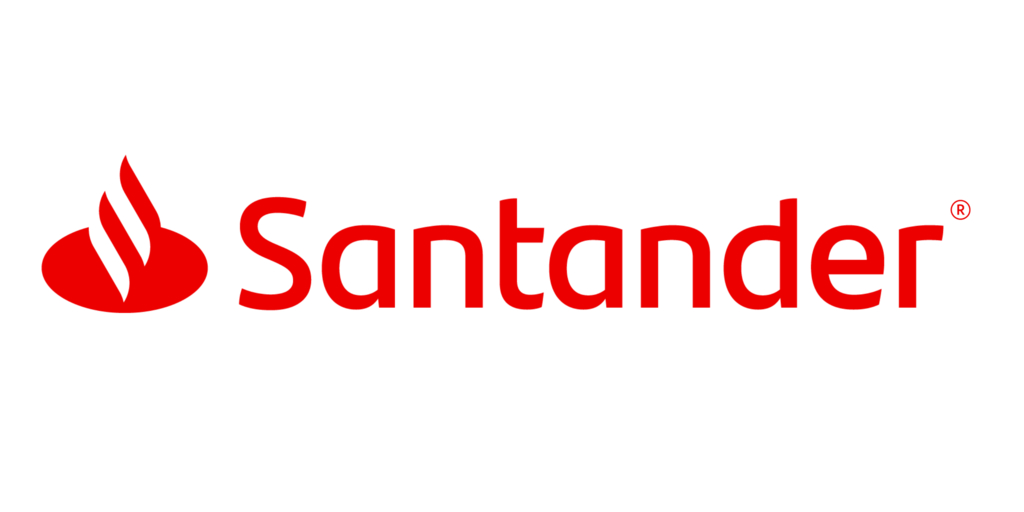Santander US Finds Auto Demand on the Rise as Workers Commute More, Feel Confident in Their Own Finances
- Pent-up auto demand ticks higher amid vehicle price uncertainty and more frequent commuting.
- 77% believe they are on the right track to financial prosperity, a new survey high.
- Concerns about inflation have leveled off but remain elevated.
- As home prices soar, renters see their housing situation as a more affordable alternative.
BOSTON–(BUSINESS WIRE)–Santander Holdings USA, Inc. (“Santander US”) today announced new survey findings that show a rise in pent-up auto demand as middle-income Americans return to the workplace, with more than four in 10 (42%) having increased the number of days they drive to work over the last year. While 52% delayed buying a vehicle in the last 12 months due to cost, 47% are considering a vehicle purchase in the year ahead, up from 41% in mid-2023. These prospective buyers are feeling a sense of urgency amid recent price uncertainty. Of those considering a vehicle purchase, two-thirds believe auto prices will increase over the next three months, and 53% are more likely to purchase during that time due to rising cost concerns. The interest in vehicles comes at a time when middle-income consumers are confident in their own finances. Nearly eight in 10 (77%) believe they are on the right track to financial prosperity, a new survey high, while 18% feel financially insecure, a new low.
Vehicle access remains essential for middle-income Americans’ financial wellbeing, with nearly one-quarter (74%) relying on a vehicle to get to work and less than half (48%) having access to public transportation. As many workers return to pre-pandemic norms, two-thirds say daily vehicle access is essential because they cannot work from home. While middle-income Americans recognize the importance of their vehicles, more than four in 10 auto owners (44%) have concerns about reliability. These factors may be contributing to prospective buyers taking steps toward purchasing. Of those considering a vehicle purchase, two-thirds have begun to research options, and close to half (46%) have visited a dealership. Overall, more than one-third of middle-income Americans (34%) plan to buy a vehicle in the next year.
The Q1 Santander US study, which builds upon previous research, looks at middle-income Americans’ current financial state and outlook for the next 12 months. It examines how economic conditions and other trends are impacting these households and the adjustments they are making in response, including their vehicle, banking and housing needs.
Consumers Remain Resilient Despite Sticky Inflation
Middle-income Americans’ optimism is buoyed by being current on their bills (76%) and feeling secure in their jobs (78%)—the two factors most associated with prosperity, according to the survey. Inflation, however, continues to be their #1 financial obstacle, and more than three-quarters (77%) consider it a major concern, consistent with levels seen in Q4. Despite these challenges, households remain resilient by making necessary adjustments, and nearly half (48%) believe they are managing higher prices better than a year ago. More than eight in 10 (86%) report taking some action to deal with inflation in Q1, such as cutting back on retail spending (54%) and forgoing travel/entertainment (34%). Meanwhile, those anticipating a recession in the next 12 months remains relatively low (56%) despite a six percentage-point increase from Q4.
Homeownership Not Considered Essential
As home prices remain elevated, middle-income Americans are questioning the longstanding association between homeownership and financial prosperity. In fact, less than three in 10 (29%) believe homeownership is a requirement to be financially prosperous, with renting and multifamily housing seen as more flexible and affordable alternatives. Six in 10 renters (61%) say renting is more affordable than having a mortgage, and nearly seven in 10 of those living in multifamily homes (68%) believe they allow more financial flexibility for residents. The research also shows recent homebuyers—those who purchased homes in the last five years—are struggling with their finances. Nearly seven in 10 (69%) must make spending cuts to keep up with homeownership costs, compared to 45% of those who purchased homes more than five years ago.
The Role of Banks in Achieving Prosperity
Middle-income Americans are utilizing bank products and services—such as digital account access, personal lending products and deposit accounts that pay competitive rates—to improve their finances. Close to seven in 10 (69%) say being able to monitor their accounts with 24/7 digital access is “very important,” and 86% bank digitally at least half the time. Promisingly, more consumers are utilizing savings accounts that pay higher interest rates, with 46% having moved money to earn a higher rate, up from 32% in Q2 2023. Meanwhile, more than half (53%) are considering a personal loan, including to consolidate debt or help pay for a large purchase, and seven in 10 who carry credit card debt (71%) agree personal loans are a good tool to help pay down high-interest debt faster.
This research on financial prosperity, conducted by Morning Consult on behalf of Santander US, surveyed 2,266 Americans who are bank and/or financial services customers, ages 18-76. Survey participants are employed or looking for work, own/use at least one financial product and are the primary or shared decision-maker on household finances with household income in the “middle-income” range of ~$53,000 to $161,000. This Q1 study was conducted February 14 – 16, 2025. The interviews were conducted online, and the margin of error is +/- 2 percentage points for the total audience at a 95% confidence level. Percentages may not total 100 due to rounding. The data was weighted to target population proportions for a representative sample based on age, gender, ethnicity, region and education.
The full report and more information about the Santander US survey is available HERE.
About Santander US
Santander Holdings USA, Inc. (SHUSA) is a wholly-owned subsidiary of Madrid-based Banco Santander, S.A. (NYSE: SAN) (Santander), recognized as one of the world’s most admired companies by Fortune Magazine in 2025, with approximately 173 million customers in the U.S., Europe and Latin America. As the intermediate holding company for Santander’s U.S. businesses, SHUSA is the parent company of financial companies with more than 11,300 employees, 4.5 million customers, and assets of $165 billion in the fiscal year ended 2024. These include Santander Bank, N.A., Santander Consumer USA Holdings Inc., Banco Santander International, Santander Securities LLC, Santander US Capital Markets LLC and several other subsidiaries. Santander US is recognized as a top 10 auto lender and a top 10 multifamily bank lender and has a growing wealth management business. For more information about Santander US, please visit www.santanderus.com.
Santander Bank, N.A. is a Member FDIC and a wholly owned subsidiary of Banco Santander, S.A. © 2025 Santander Bank, N.A. All rights reserved. Santander, Santander Bank, and the Flame Logo are trademarks of Banco Santander, S.A. or its subsidiaries in the United States or other countries. All other trademarks are the property of their respective owners.
Contacts
Media Contact:
Andrew Simonelli
andrew.simonelli@santander.us
Caroline Connolly
caroline.connolly@santander.us









